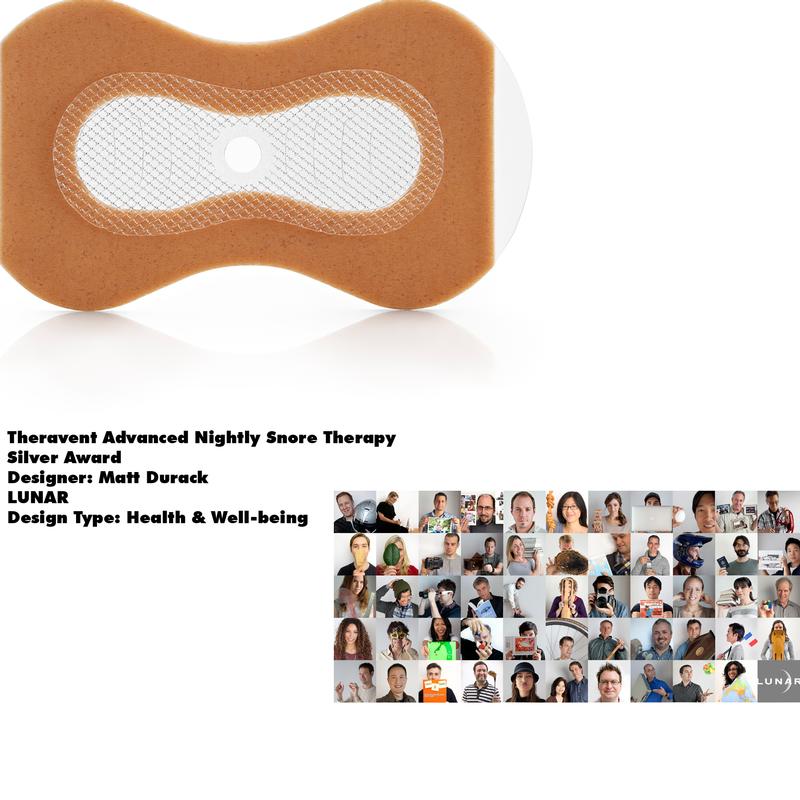2012 Galleries
The Spark Gallery pages are one of our most popular design destinations, with thousands of visitors each year. Check out some of the latest Spark entries, in the galleries below.
Galleries // 2012 Spark:Product // Theravent Snore Therapy
Theravent Snore Therapy
Winner - Silver
Competition: Spark:Product
Designer: LUNAR Design Team
Design Type: Product Medical
Website: http://www.lunar.com/
The market is flooded with nasal strips, throat sprays, mouth guards and gimmicks that promise to stop the snoring. But few if any of these products have ever been demonstrated to actually work. Yet, with 45 million snorers in the United States alone, the war against snoring is not being won. Theravent is for people whose snoring affects sleep quality for themselves or their bed partner. The Theravent concept was invented by a Stanford University Medical School professor who was looking to cure his own snoring. Recently cleared by the FDA as a non-prescription device for the intended use of reducing or eliminating snoring, Theravent utilizes proprietary MicroValves set within a hypoallergenic adhesive patch that surrounds the user’s nostrils. These valves open during inspiration and close during expiration, during which air is directed through a central hole in the device, creating resistance and expiratory positive airway pressure (EPAP). The increase in airway pressure helps stiffen and stabilize the airway, thus preventing snoring. Theravent was born out of extensive research and experiences in treating obstructive sleep apnea with Provent Sleep Apnea Therapy, a prescription product also manufactured by Ventus Medical. Provent Sleep Apnea Therapy has been proven in more than 10 clinical trials and used for nearly 2 million nights of sleep. Theravent utilizes a much lower resistance and was specifically designed for snorers without obstructive sleep apnea. In creating Theravent, the engineering and design team focused on creating an easy to use peel and go product. The goal was to create a product that required virtually no instructions and could easily be applied without using a mirror. The shape is designed to fit a wide range of users of both genders and all ethnicities, a significant design challenge given extreme differences in nasal geometries. The product has tabs on the sides for easy application and removal. There was also emphasis on creating a symmetrical design so there is no “wrong way” to apply the product. To create such a user friendly product, the team spent significant time performing adhesive testing to identify an ideal skin adhesive that would hold air pressure overnight but would also be easy and painless to remove in the morning. There was also extensive material research for the valve mechanism that would allow for easy inspiration but hold reliable expiratory resistances over the course of thousands of breaths during the night. Materials were also chosen for heat resistance during shipping and to minimize cost of goods. Since the product had to be able to be produced by the millions, it was decided to use highly specialized web conversion manufacturing as is used in the production of band-aids. However, the numbers of layers and the tight tolerances required to achieve the therapeutic resistances further created challenges for the team, which were ultimately overcome with a robust design. Theravent’s benefits have been proven in three clinical studies. The most rigorous of the studies was a prospective, randomized trial that used decibel meters to evaluate snoring duration and volume in 49 snoring patients. Patients were tested on control nights (using no therapy), using Theravent and using nasal strips. The average percent of time snoring above 40 decibels was significantly reduced for Theravent compared to the control group. For the nasal strips, snoring was not significantly different compared to the control group. According to the decibel meter, 76% of patients using Theravent had a reduction in snoring. The study also showed that bed partners experienced significantly less sleep disruption and reported significant reductions in both snoring duration and snoring volume compared to the control group. This study was one of the few studies of non-prescription snoring products that has ever shown both subjective and objective improvements in snoring. Theravent is now being recommended by sleep physicians across the United States to their patients who snore.

